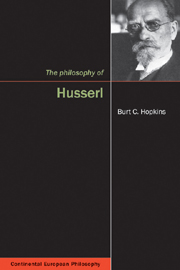Book contents
- Frontmatter
- Contents
- Acknowledgements
- Abbreviations
- Prolegomenon: Husserl's turn to history and pure phenomenology
- I Plato's and Aristotle's theory of eidē
- II From descriptive psychology to transcendentally pure phenomenology
- 4 Origin of the task of pure phenomenology
- 5 Pure phenomenology and Platonism
- 6 Pure phenomenology as the transcendental-phenomenological investigation of absolute consciousness
- 7 Transcendental phenomenology of absolute consciousness and phenomenological philosophy
- 8 Limits of the transcendental-phenomenological investigation of pure consciousness
- III From the phenomenology of transcendental consciousness to that of monadological intersubjectivity
- IV From monadological intersubjectivity to the historical a priori constitutive of all meaning
- V The unwarranted historical presuppositions guiding the fundamental ontological and deconstructive criticisms of transcendental philosophy
- Epilogue: Transcendental-phenomenological criticism of the criticism of phenomenological cognition
- Coda: Phenomenological self-responsibility and the singularity of transcendental philosophy
- Notes
- Bibliography
- Index
5 - Pure phenomenology and Platonism
from II - From descriptive psychology to transcendentally pure phenomenology
- Frontmatter
- Contents
- Acknowledgements
- Abbreviations
- Prolegomenon: Husserl's turn to history and pure phenomenology
- I Plato's and Aristotle's theory of eidē
- II From descriptive psychology to transcendentally pure phenomenology
- 4 Origin of the task of pure phenomenology
- 5 Pure phenomenology and Platonism
- 6 Pure phenomenology as the transcendental-phenomenological investigation of absolute consciousness
- 7 Transcendental phenomenology of absolute consciousness and phenomenological philosophy
- 8 Limits of the transcendental-phenomenological investigation of pure consciousness
- III From the phenomenology of transcendental consciousness to that of monadological intersubjectivity
- IV From monadological intersubjectivity to the historical a priori constitutive of all meaning
- V The unwarranted historical presuppositions guiding the fundamental ontological and deconstructive criticisms of transcendental philosophy
- Epilogue: Transcendental-phenomenological criticism of the criticism of phenomenological cognition
- Coda: Phenomenological self-responsibility and the singularity of transcendental philosophy
- Notes
- Bibliography
- Index
Summary
The simple givenness of ideality
The account of the origin and development of Husserl's pure phenomenology so far has identified two important contexts for grasping as a “task” the significance of both his formulation of its method and the achievement of its goals. First, his realization of the shortcomings of a more or less orthodox adherence to the principles of Brentanian descriptive psychology for providing an adequate account of the concept of number formation generated the task of reforming these principles in a manner appropriate for the investigation of the ideal meanings that are operative in mathematics and pure logic. Second, his realization that even a reformed descriptive psychology operated with a fundamental presupposition that prevented the proper methodical access to the ideal meanings of mathematics and pure logic generated the task of reformulating the descriptive moment of descriptive psychology as a pure phenomenology dedicated to providing such access. The task-oriented character of “pure phenomenology” thus signals that it is not a finished philosophical system but a method of research and, above all, that a research agenda drives its methodology.
The research agenda of the Logical Investigations is the investigation of the intentional concept formation, or “constitution” (Husserl's preferred word), of the ideal meanings of mathematics and pure logic, the general status of which he termed “ideality”. Rather than focus on resolving the problem in the Philosophy of Arithmetic that led to his rejection of psychologism, the “constitution” of the objective unity of the concept of whole that is characteristic of a multitude, namely, the concept of the collective combination, Husserl's investigations in the Logical Investigations focus on the problem of the constitution of ideality per se.
- Type
- Chapter
- Information
- The Philosophy of Husserl , pp. 96 - 109Publisher: Acumen PublishingPrint publication year: 2010

